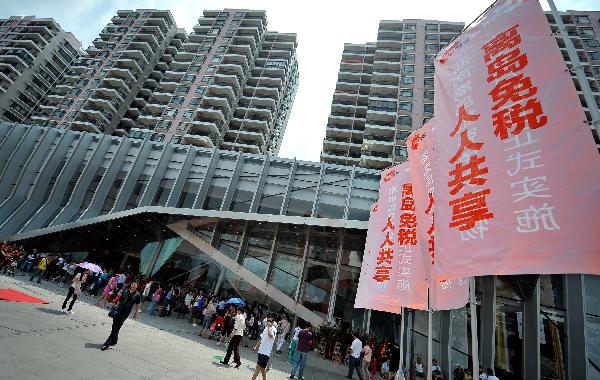S. China's island Hainan launches tax rebate program to woo tourists
|
Photo taken on April 20, 2011 shows the exterior view of a newly-built tax-free shop in Sanya, south China's Hainan Province. An offshore tax-free scheme for mainland shoppers is due to kick off on a trial basis across Hainan from April 20. The policy will prevent mainland visitors from paying various types of taxes on up to 5,000 (762 US dollars) worth of imported goods bought at selected duty-free stores on the tropical islands province in the south China. Only travelers who are 18 or older will avoid paying import duties, and the mainland visitors to Hainan can only buy goods duty free at the shop twice a year, while island residents can only once a year. Permission to buy goods duty-free in Hainan had been extended to foreign and non-mainland travelers before, but never to mainland visitors. [Xinhua/Guo Cheng] |
Hainan, China's southernmost island province, has been famous for its 3S: sea, sun and sand. Now, it can add a fourth S - shopping.
The provincial government launched a tax rebate program Wednesday as part of its efforts to build the island into an international tourist and shopping destination.
Starting April 20, tourists visiting the island and local residents will be able to purchase tax-free commodities from designated shops before flying to other destinations in China.
Before the tax-free pilot store opened at 10:10 a.m., thousands of shoppers had already lined up outside the shop in Sanya.
Zhu Yan, a tourist from eastern China's Zhejiang Province, is one of the shoppers who swarmed the store.
Almost all the members of her tour group, except a few elderly tourists, came to the tax-free shop, Zhu said.
"I used to buy tax-free commodities, like cosmetics and perfume, in Hong Kong. Now I have another choice here in Hainan, which made my trip more exciting," Zhu said.
Taxes eligible for rebates include customs duties, import value added taxes and consumer taxes. When combined, these rebates reduce prices by 10 to 35 percent.
The tax-free shop in Sanya, managed by the China Duty Free Group, has a shopping area of 7,000 square meters and offers 18 types of imported commodities, including jewelry, handicrafts, watches, perfumes and cosmetics.
The trial program sets the rebate cap on commodities worth no more than 5,000 yuan (765 U.S. dollars) for each purchase.
Eligible tourists, those 18 years and older, can purchase tax-free commodities twice a year, while island residents can purchase such commodities once a year.
Travel agencies across the country have seen the program as a business opportunity.
A 24-member tour group organized by the Zhejiang branch of China International Travel Service arrived in Sanya, a coastal resort town on the island's southern tip, on Tuesday and chose the tax-free store for the first stop of their five-day tour.
He Xuejuan, a marketing manager for Haizhiyuan, a local travel agency, told reporters that her company also included the tax-free store in their tour services.
"Many tourists have shown a strong interest in the rebate program and I imagine that there will be a bright future in including the tax-free store in tour services," He said.
The program is part of the province's plan to build the island into a world-renowned tourist destination, China's Ministry of Finance (MOF) said in a statement released on its website last month.
On March 24, the MOF and other ministries ratified the program modeled on similar schemes on the Republic of Korea's Jeju Island and Okinawa, Japan.
Wednesday's program launch is another step taken by the provincial government to build the island into a more attractive tourist destination for visitors from home and abroad.
The island inaugurated a similar program on January 1 targeted at foreign tourists. Under this program, foreign tourists and citizens from Hong Kong, Macao and Taiwan who have lived in China's mainland for no more than six months are eligible for an 11 percent tax rebate on purchases of 324 items across 21 categories.
The program's launch makes Hainan the fourth island in the world to implement a tax-rebate scheme, said Du Liyin, Director of the Sanya Tourism and Development Commission.
"While offering a better shopping environment for tourists, the program will also boost the development of the island province as an international tourist destination," Du said.
Hainan, China's largest special economic zone, enjoys preferential development policies.
Hainan hosted nearly 26 million overnight tourists in 2010 and 30 million tourists are expected to visit the island this year, partly due to the latest tax rebate scheme, said Lu Min, director of the foreign investment department of Hainan's provincial commerce bureau.
Hainan's efforts echo the central government's ambitions of developing the country's tourism industry into a pillar service industry.
According to a five-year development outline for the country's tourism industry, China hopes to attract 3.3 billion tourists by 2015, up from 2 billion registered in 2010.
Hainan's tax rebate program has inspired cities in other parts of China to adopt tax refund programs. Shanghai's Pudong District and island city of Zhoushan in Zhejiang Province are both mulling similar tax schemes, which have yet to be approved by the central government.
 0
0 







